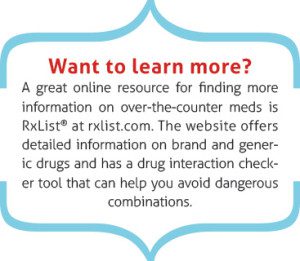

Make your medicine cabinet a safe place with the right information and a healthy dose of caution.
By Julianne Hale



Another unfortunate side effect of aging is that our pill cases, once small and able to fit into our purses and pockets, tend to grow. The addition of these drugs and supplements into our daily routine can wreak havoc on our bodies when combined with use of certain OTC medications. Older adults may have to adjust their thinking about OTC drugs and be mindful of possible interactions or dosage changes.
Being Med Wise



Doctors Express Urgent Care
When it comes to OTC medications, knowledge is power. Get familiar with the active ingredients in the medications you use – they’re listed first on the label – and find out what they are designed to treat. OTC medications that treat multiple symptoms will list more than one active ingredient. If you take multiple OTC pills a day, it’s critical to be familiar with the active ingredient in each drug so that you do not overdose by taking two pills with the same active ingredient.
Are you taking a pill for your sniffles that also contains a cough suppressant or a painkiller? If the answer is yes, ask your pharmacist or doctor about an alternative medication that treats only the symptoms you have and drops the unnecessary ingredients.
Another thing that’s important to understand is that certain OTC medications may prevent your body from absorbing your prescription medication properly. Make sure to talk to your prescribing doctor about any new drugs you need to take – often, new prescriptions may require some adjustments. Does the drug interact with any common OTC drugs? Is there anything you should avoid while taking it? This information can empower you to make informed choices about your health.
Dosage Instructions
You may view the dosage instructions on medications as more of a suggestion than a hard and fast rule. But the directions on your OTC and prescription drugs are supposed to be followed to the letter. Make sure you take the exact dosage recommended on the label or by your doctor. Do not exceed it or take it more often than is recommended. This kind of pill popping can have disastrous results. Case in point: acetaminophen, one of the most common OTC painkillers, can cause liver damage if you take more than the recommended amount.
It’s also important to remember that taking OTC medication regularly for an extended period is not a good idea. In most cases, OTC medications were designed to treat symptoms in the short term, which in most cases refers to 10 days or less.
Dr. Natasha Ballard with Doctors Express Urgent Care explains that a common mistake she sees is extended use of painkillers for headaches. “The problem with that is that it can trigger rebound headaches,” she says. “Taking ibuprofen or Tylenol for headaches works in the short term, but if the headaches continue to come back, I recommend patients stop using them for at least two to three days.”
Understanding Interactions



Pharm.D., Walgreens Pharmacy
OTC Meds with Other OTC Meds. There are over 100,000 OTC medications on the market. When you’re sick, it’s tempting to head over to your nearest drugstore and grab two or three boxes of drugs that claim to treat your symptoms – but this can be a dangerous game. For example, over 600 different OTC and prescription medications contain acetaminophen. Checking the active ingredient will ensure that you do not inadvertently take a double dose of this potentially harmful drug.
OTC Meds with Alcohol. Many cold and sinus medications contain diphenhydramine, an antihistamine that can cause drowsiness. Drinking alcohol intensifies its effects and can make you unable to drive or function at a normal level. In addition, many cough medications contain alcohol, making the effects of drinking come on more quickly than is normal.
Mixing OTC Meds with Prescription Meds. The prescription drugs in our daily routines can have serious, even life-threatening, interactions if they are taken with certain OTC drugs. For example, people who are on blood thinners should not take aspirin or ibuprofen – the interaction of these two drugs can lead to serious internal bleeding. Talking to your doctor about your prescription drugs and becoming familiar with them will help reduce any risk of dangerous interactions.
Andrew S. Crowe, a pharmacist with Walgreens, emphasizes the importance of a good working relationship between doctor, patient, and pharmacist. “I really like to stress open communication and follow-up appointments after a new medication is prescribed,” he says. “The art of medicine is about figuring out what works, and if something isn’t working, we can adjust dosing or tailor medications to that person with their unique pre-existing health conditions.”
Mixing OTC Meds with Certain Supplements. “Supplements like fish oil and garlic will make you bleed a lot more if you take them alongside certain OTC medications, specifically painkillers,” says. Dr. Ballard. “Often people will come into the office with lacerations and not understand why they are bleeding so much.”
OTC Meds and Medical Conditions. Over-the-counter medicines were designed for people who are essentially healthy, so if you have a chronic health condition, make sure to speak to your doctor about which OTC drugs you can and cannot take.
“One common mistake is taking a nasal decongestant when you have high blood pressure,” says Crowe. “Decongestants can increase heart rate and constrict blood vessels, so it’s important for patients to discuss taking them with their doctor. For people who need symptomatic relief, one alternative is Coricidin. ”
“Another common mistake is for people with diabetes to take a product containing a cough suppressant, which results in an increase in blood sugar levels,” Crowe adds. “The good thing is, there are similar products for diabetics that are sugar-free.”
Prescription and over-the-counter medications can ease our pain, lower our blood pressure, clear our sinuses, keep our cholesterol in check, and improve our quality of life, but it’s important to equip ourselves with the knowledge we need to avoid harmful interactions and side effects. Talk to your doctor, read your labels, and never be afraid to ask questions!




